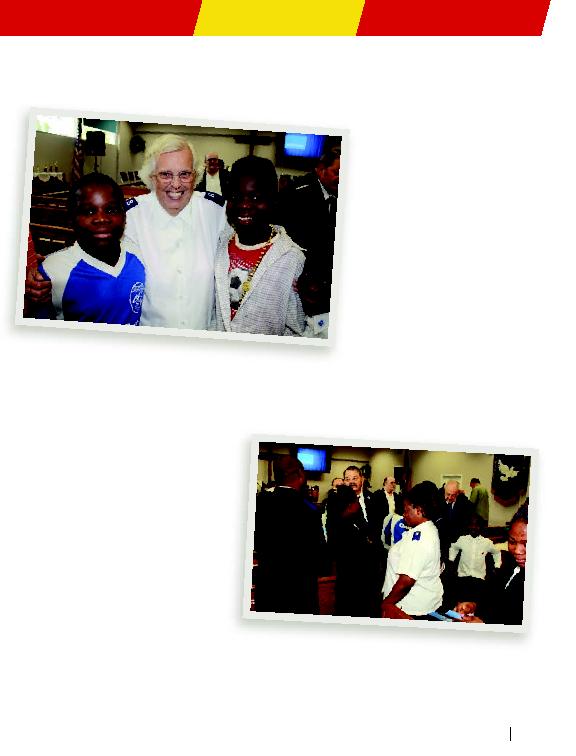
17
The War Cry | NOVEMBER 2014
"Imagine my pleasant surprise when soldiers
from my country walked in!" he says.
In the Sundays that followed, the three Congolese
soldiers brought with them their family members--some
of whom were already Salvationists, and others who
would eventually be enrolled in the months
that followed.
"Our soldiership numbers nearly doubled!"
For their part, the Tonawanda corps members
immediately embraced their new comrades and
loved them from the start.
"We became one big family," says Jeannette
Hammond, a soldier at Tonawanda for many
years and the current Home League Secretary.
"We already had a few Hispanic, Korean and
Chinese members here and there--so now we
just call ourselves a `League of Nations!'" she
says, laughing.
The road was a very long one for the two
dozen or so Congolese who are now becoming
Americanized Salvationists. For most of them,
escaping their country's ongoing civil war forced
them into refugee camps. A few of them spent 14 years
in one camp that burgeoned with 5,000 refugees.
An estimated 100,000 refugees presently languish
in Congolese refugee camps.
"A Salvation Army officer came to the camp regularly
to minister to those of us inside who are Salvationists,"
explains Augustine Bassidiniaki
through an interpreter. Augustine says
that for the several years she, her
family, and other Salvationists were in
that refugee camp; they had what
amounted to an unofficial corps--com-
plete with worship services and other
traditional Salvation Army activities.
The U.S. State Department sent personnel
to the refugee camps to interview potential
prospects for relocation to America. Canada
and Australia were among other nations
attempting to help alleviate the situation
by accepting refugees into their borders.
"When we were interviewed, what we
answered was scrutinized very carefully,"
Augustine says, "and even then there
were no guarantees that any of us would
be chosen."
If a husband or wife were selected, the spouse auto-
matically was included as well. But as was the case
with one couple that was only engaged while living in
the refugee camp, they had to go ahead and marry
before being allowed to leave for the U.S.
One question asked of each refugee was
whether they knew anyone in the U.S., and what city
that person lived in. The only reason why this group of
refugees landed in Buffalo is that they knew someone
who had immigrated there some time before.
The two dozen or so Congolese refugees who came to
"Imagine my pleasant surprise when soldi
diers
f
t
lk d i !" h
f
t
a
p
tr
to
pr
an
at
by
an
Au
wer
be c
If h b d
bers
nd
e
y.
,
ed
14 years
One question askedd offf ea h
h
h
ch r f
ef
ef
efugg
ug
ugee
ee
ee
ee w
w
w
was
as
as
as
h th th
k
i th U S
d h t it
Two cultures interact
as one at the Buffalo
Tonawanda Corps.
Hugs are part
of a universal
language.
